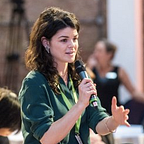Team norms — how to work with your cofounder
The early stages of a co-founding relationship are fragile. You are not only trying to explore a new idea, but also a new working relationship. It can be difficult to juggle both simultaneously, but there are some simple things you can do to make this testing period work. We see this at EF regularly, where we take 100 people at the beginning of the programme and help them form 25–30 teams. This is some of the advice we share with them.
Create a rhythm
Goals guide your productivity
Productivity is traction for teams and goals provide a forcing mechanism to evaluate this. If your team isn’t being productive, it’s highly unlikely this is the right co-founding relationship and you need to break up and start again.
Set short term and long term goals. What are you going to achieve this week? What are you going to produce? What are you going to have learnt this week? Read this to understand how you can break down your long term goals into short term actions.
Alignment with your co-founder is vital and easy to get wrong. Double check that you and your co-founder agree what you want to achieve. Keep each other in check by ensuring that the work you are doing directly contributes to your goal.
Once you agree your goals they should guide how you structure your day and prioritise your work (as a team). Make sure you have a daily checkin — either a morning standup, or a checkout to hold each other to account.
Remove friction from communication
Slack is not a substitute for conversation. You should be working in the same place as your co-founder. This doesn’t have to be an office, but you should be spending the majority of your working time together.
Why?
You are in the early stages of developing a co-founding relationship and you need to invest face time into understanding each other.
When we see teams fail, we often then find out that they haven’t been working in the same place, or haven’t worked closely together for some time. We find many of our best teams live together.
Working norms
Have an agreement about how, when and where you will work. What are your core working hours? When do you have lunch (make sure you eat lunch together)? When will you update each other on your work? When will you have discussions about what you have learnt from your customers? When will you build?
Norms help you balance your expectations of each other.
Build your team
This means your co-founding team, not your other team mates. Often we see teams hire people before they have solidified their co-founding relationship and taken the time to get to know and understand each other.
Meet together then eat together
It’s super simple. Eat together once a day for 30 mins. Talk about the startup, talk about what’s going on in your life. Talk about what you’re worried about. At EF we still have team lunch every day.
Positivity
The next couple of months are going to be hard. Really hard. At times you will be stressed and you’ll want to take this out on the person nearest you (this should, at almost all times, be your cofounder).
Be positive.
Be generous.
You are both going through a tough experience and you need to support each other. If your cofounder is having a bad day, be positive and help them see the light. And they’ll do the same for you.
Over Christmas I read a really interesting book on positivity and I wrote some thoughts on how this applies to startups here.
What to communicate
Quality communication is face to face. There is no substitute.
What should you be communicating about?
+ What you’re working on
+ What you’ve learnt and how that affects the product/company
+ What you’re worried about
+ What else is going on in your life
Sometimes it can be useful to have forcing mechanisms to ensure you are communicating enough. For example:
+ Lunchtimes away from your laptop
+ morning or evening checkins/checkouts
+ weekly problem solving sessions where you take a couple of hours to brainstorm
Resilience wins
The best founders are the ones that don’t stop. They are super resilient and are able to push through the many ups and downs of founding.
They don’t do this by driving themselves into a wall.
Be vulnerable
Building a startup is hard. You will struggle at times. But so will your co-founder. Use each other for emotional support. Your co-founder is the only person who will ever know truly how fucked/awesome things are (and that might be in one day). The more you can share your concerns and joy with each other, the stronger your team will be.
Chilling out
Make sure you find out what helps you relax. Whether it’s exercise, seeing friends or gaming. Even better, chill out with your cofounder.
Taking some down time will keep you healthy. This is a marathon, not a sprint.
